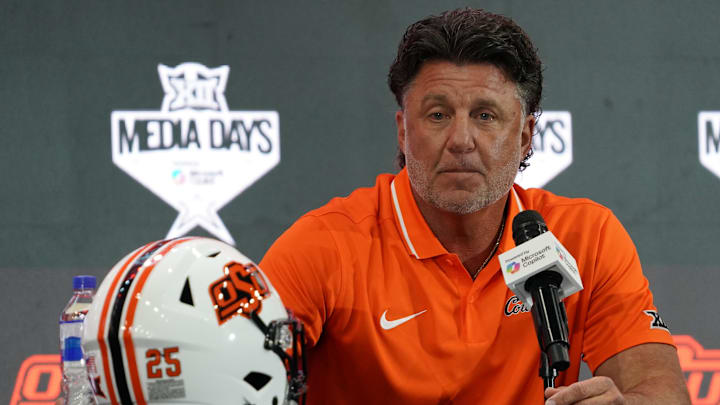If there's one thing that's known about Oklahoma State head coach Mike Gundy, it's that he's unafraid to speak his mind and reveal his true feelings, for better or for worse.
His unfiltered approach has drawn harsh criticism in the past, but it can also be refreshing when so many in the industry use "coach-speak" and never really say much of anything. That's not an issue for Gundy, and when he was asked about the future of college athletics, he said what needed to be said.
In speaking with Andy Staples and Ari Wasserman of On3, Gundy said what pretty much everyone else is thinking, but has been too afraid to say out loud about the new era of college football in the wake of the landmark House vs. NCAA settlement:
"You've gotta restructure your systems and admit players are employees," Gundy said.
"Then you can build collective bargaining. We've all talked about it. But you have to admit they're employees. You can do it all. You can have a [cap] and you need an entry level for a high school player coming in because it's not sustainable."
Gundy is far from alone in calling the current nature of college athletics unsustainable. Coaches from across the country, and across every sport, have been sounding that alarm ever since NIL payments to athletes became legal.
The term "collective bargaining" is terrifying for administrators. They're begrudgingly giving athletes a slice of the pie now with revenue-sharing officially greenlit, but they still want to ensure the largest portion goes on their own plate. And the money they are now being forced to pay athletes is just going to end up coming out of the pockets of fans. Ticket prices, merchandising, and the like will continue to steadily rise so athletic departments can try to offset the cost of the money they have to give the student-athletes.
If college sports are going to be professionalized, guardrails have to exist
Even after the House vs. NCAA settlement, college sports are still the wild west right now. Money is flying, legally and illegally, and programs are spending more than ever before to build contenders. Money is a finite resource for most, and eventually, the well is going to begin to run dry. College football may not suffer, but non-revenue sports will.
College sports are now effectively professional sports. The sooner that's accepted, the sooner some guardrails can finally be put in place. There's a salary cap in the majority of professional sports. There's a rookie-wage scale in the NFL and NBA, limiting the amount of money first-year players can make immediately.
If these guardrails don't come, then smaller schools will continue to be fazed out of the hierarchy of college football. NIL was thought to be the great equalizer, but all it has done is create a bigger divide between the haves and have-nots. Sure, some former have-nots have transitioned into the "have" section, but there's still a giant dividing line that exists.
If things don't change, and soon, a new division of college football could develop, leaving behind the schools with smaller checkbooks.
